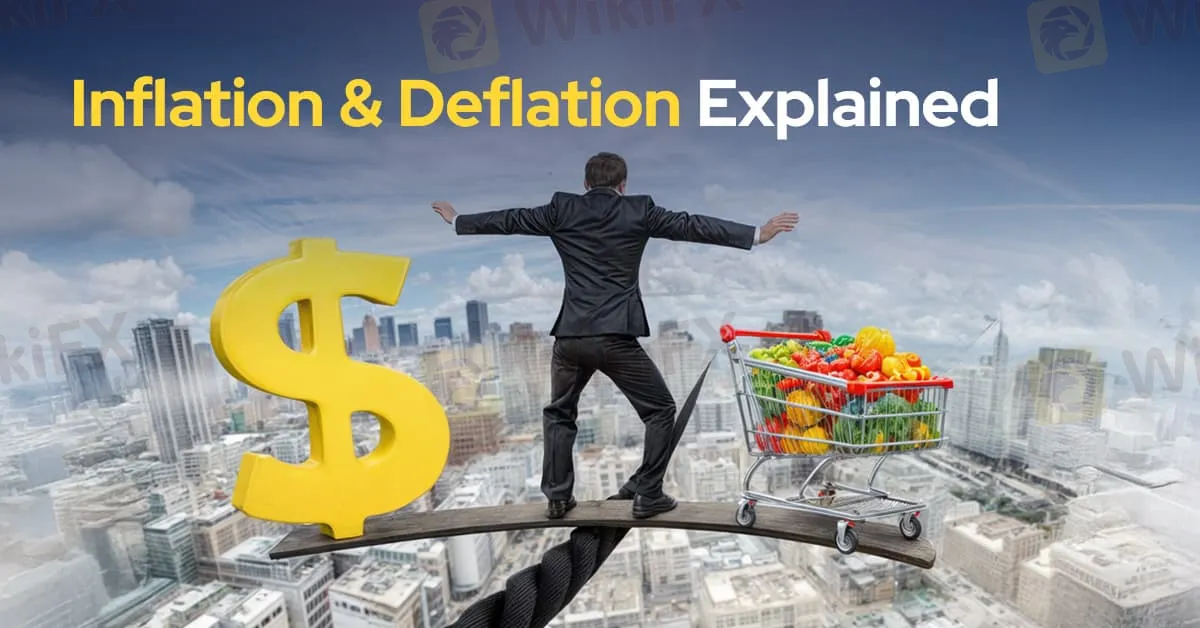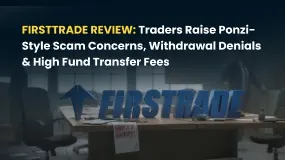简体中文
繁體中文
English
Pусский
日本語
ภาษาไทย
Tiếng Việt
Bahasa Indonesia
Español
हिन्दी
Filippiiniläinen
Français
Deutsch
Português
Türkçe
한국어
العربية
Inflation & Deflation Explained
Abstract:This article delves into the definitions of inflation and deflation, their causes, effects, and implications for the trading environment.

Inflation and deflation are fundamental economic concepts that play a crucial role in shaping markets, purchasing power, and overall economic stability. These terms are essential for anyone involved in trading, investing, or understanding the financial landscape. This article aims to explain the definitions of inflation and deflation, explore their causes and effects, and discuss their implications for traders and the broader economy.

Inflation refers to the general rise in the prices of goods and services over time, which leads to a decline in the purchasing power of money. In simpler terms, inflation means that each unit of currency buys fewer goods and services than it did previously. Inflation is usually measured using indices such as the Consumer Price Index (CPI) or the Producer Price Index (PPI), both of which track price changes in a basket of consumer goods and services.
Inflation can result from several factors. One common cause is demand-pull inflation, which occurs when the demand for goods and services exceeds supply. For instance, during an economic boom, increased consumer spending can push prices higher as businesses struggle to meet demand. Another cause is cost-push inflation, which arises when production costs, such as wages and raw materials, increase. Companies may then pass these higher costs onto consumers by raising prices. Finally, there is built-in inflation, which is tied to adaptive expectations. As workers demand higher wages to cope with rising living costs, businesses respond by increasing prices, creating a cycle that sustains inflation.
The effects of inflation can be both positive and negative. On the positive side, moderate inflation is often viewed as a sign of a growing economy. It encourages spending and investment, as consumers are incentivized to make purchases before prices rise further. However, on the negative side, high inflation erodes purchasing power, which can reduce consumer confidence and spending. In extreme cases, hyperinflation—characterized by rapid and out-of-control price increases—can lead to economic collapse, as seen in historical examples like Zimbabwe and Weimar Germany.

In contrast, deflation is the opposite of inflation and involves a general decrease in the prices of goods and services. During deflation, the purchasing power of money increases, meaning that consumers can buy more with the same amount of currency. Although this might sound beneficial, deflation can signal underlying economic problems.
Several factors can cause deflation. A key cause is a decrease in aggregate demand, which happens when consumer and business spending falls significantly. This could result from economic recessions, high unemployment, or declining consumer confidence. Another factor is technological advances, which can lower production costs and thus reduce prices. While beneficial to consumers, this can lead to deflationary pressures if price drops are significant. Additionally, tight monetary policy—where central banks reduce the money supply to combat inflation—can sometimes overshoot and trigger deflation.
The effects of deflation present challenges to the economy. One significant issue is decreased consumer spending. When people expect prices to continue falling, they may delay purchases, which reduces demand and can lead to further price declines. Deflation also increases the burden of debt. As prices fall, the real value of debt rises, making it harder for borrowers to repay loans, which can lead to higher default rates and financial instability. Prolonged deflation can result in stagnation, with businesses struggling to stay profitable, leading to high unemployment, reduced production, and declining wages.
Both inflation and deflation have profound implications for traders and investors. For instance, interest rates are often adjusted by central banks in response to these economic conditions. Central banks may raise interest rates to combat rising inflation or lower them during deflation to stimulate spending. Additionally, inflation can erode the value of fixed-income investments like bonds, making equities and commodities more attractive, while deflation may increase demand for safe-haven assets like gold. Both inflation and deflation can also lead to market volatility, as uncertainty about the economic environment can make markets more unpredictable. Traders need to stay informed about key economic indicators and central bank policies to make sound decisions.
In conclusion, understanding inflation and deflation is vital for navigating the complex world of finance. Inflation, when moderate, often signals economic growth, but unchecked inflation can harm purchasing power and market stability. Deflation, while it may offer short-term benefits, carries significant long-term risks, such as economic stagnation. For traders and investors, keeping a close watch on these trends is essential for making informed decisions and positioning themselves effectively in the ever-evolving financial markets.

Disclaimer:
The views in this article only represent the author's personal views, and do not constitute investment advice on this platform. This platform does not guarantee the accuracy, completeness and timeliness of the information in the article, and will not be liable for any loss caused by the use of or reliance on the information in the article.
Read more

Is Amillex Safe or a Scam? Understanding Rules and Security
You are asking an important question: Is Amillex safe or a scam? The simple answer is that Amillex works in an unclear area that needs careful study. It is not a complete scam like fake websites that steal your money right away, but it also does not meet the safety rules of the best, well-regulated brokers. Read on to explore more details.

Saxo Bank Japan Expands European Stock Portfolio with UBS, Ferrari, and Other Major Names
Saxo Bank Japan is broadening its investment offerings by adding over 100 European stocks from Denmark, Italy, Spain, and Switzerland. The expansion—set to launch on November 5, 2025—includes globally recognized companies such as UBS, Ferrari, Novo Nordisk, and Nestlé. This initiative enhances Saxo Bank Japan’s already extensive global stock lineup, aiming to support investors seeking diversification into leading European industries.

Amillex Broker Affiliate Program: A Complete Guide to Earning with Referrals
The Amillex Broker affiliate and partnership programs offer an excellent chance for people and businesses to earn steady income by referring new traders. Simply put, this is your opportunity to make money from your network, website visitors, or social media followers by working with a trusted, high-quality broker. This partnership gives you competitive payment rates, strong benefits for partners, and reliable support to help you succeed. This complete guide covers everything you need to know, from understanding how you can earn money to following a clear plan for increasing your income. We will show you how to turn your influence into steady and growing earnings.

Firsttrade Review: Traders Raise Ponzi-Style Scam Concerns, Withdrawal Denials & More Issues
Have you lost all your capital while trading via Firsttrade? Does the US-based forex broker disallow you from withdrawing funds? Do you have to pay massive fees when transferring funds? Does your trade get affected because of frequent malfunction in the trading app? These have been haunting many traders at Firsttrade. Consequently, many of them have raised complaints online. In this Firsttrade review, we have shared such complaints. Keep reading to know about them.
WikiFX Broker
Latest News
Is Nash Markets Regulated or Risk? Truth About Nash Markets’ License & Withdrawal Issues
Webull Widens Crypto Futures with Coinbase Derivatives
Latest FCA Daily Alerts and Consumer Warnings for 2025
Annual Sales Of New Vehicles Expected To Hit Only 15.7 Million Units: Cox
Amillex Broker Affiliate Program: A Complete Guide to Earning with Referrals
Saxo Bank Japan Expands European Stock Portfolio with UBS, Ferrari, and Other Major Names
New SC Rules Take Effect in November 2025: What’s Next for Finfluencers?
Is Amillex Safe or a Scam? Understanding Rules and Security
Amillex Broker Review 2025: Features, Fees, and Safety
XM Broker Celebrates 15 Years with $35,000 Bonus Promotion
Currency Calculator



